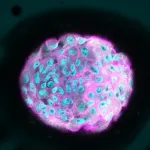(Press-News.org) Researchers have genetically engineered a marine microorganism to break down plastic in salt water. Specifically, the modified organism can break down polyethylene terephthalate (PET), a plastic used in everything from water bottles to clothing that is a significant contributor to microplastic pollution in oceans.
“This is exciting because we need to address plastic pollution in marine environments,” says Nathan Crook, corresponding author of a paper on the work and an assistant professor of chemical and biomolecular engineering at North Carolina State University.
“One option is to pull the plastic out of the water and put it in a landfill, but that poses challenges of its own. It would be better if we could break these plastics down into products that can be re-used. For that to work, you need an inexpensive way to break the plastic down. Our work here is a big step in that direction.”
To address this challenge, the researchers worked with two species of bacteria. The first bacterium, Vibrio natriegens, thrives in saltwater and is remarkable – in part – because it reproduces very quickly. The second bacterium, Ideonella sakaiensis, is remarkable because it produces enzymes that allow it to break down PET and eat it.
The researchers took the DNA from I. sakaiensis that is responsible for producing the enzymes that break down plastic, and incorporated that genetic sequence into a plasmid. Plasmids are genetic sequences that can replicate in a cell, independent of the cell’s own chromosome. In other words, you can sneak a plasmid into a foreign cell, and that cell will carry out the instructions in the plasmid’s DNA. And that’s exactly what the researchers did here.
By introducing the plasmid containing the I. sakaiensis genes into V. natriegens bacteria, the researchers were able to get V. natriegens to produce the desired enzymes on the surface of their cells. The researchers then demonstrated that V. natriegens was able to break down PET in a saltwater environment at room temperature.
“This is scientifically exciting because this is the first time anyone has reported successfully getting V. natriegens to express foreign enzymes on the surface of its cells,” Crook says.
“From a practical standpoint, this is also the first genetically engineered organism that we know of that is capable of breaking down PET microplastics in saltwater,” says Tianyu Li, first author of the paper and a Ph.D. student at NC State. “That’s important, because it is not economically feasible to remove plastics from the ocean and rinse high concentration salts off before beginning any processes related to breaking the plastic down.”
“However, while this is an important first step, there are still three significant hurdles,” Crook says. “First, we’d like to incorporate the DNA from I. sakaiensis directly into the genome of V. natriegens, which would make the production of plastic-degrading enzymes a more stable feature of the modified organisms. Second, we need to further modify V. natriegens so that it is capable of feeding on the byproducts it produces when it breaks down the PET. Lastly, we need to modify the V. natriegens to produce a desirable end product from the PET – such as a molecule that is a useful feedstock for the chemical industry.
“Honestly, that third challenge is the easiest of the three,” says Crook. “Breaking down the PET in saltwater was the most challenging part.
“We are also open to talking with industry groups to learn more about which molecules would be most desirable for us to engineer the V. natriegens into producing,” Crook says. “Given the range of molecules we can induce the bacteria to produce, and the potentially vast scale of production, which molecules could industry provide a market for?”
The paper, “Breakdown of PET microplastics under saltwater conditions using engineered Vibrio natriegens,” is published open access in the AIChE Journal. The paper was co-authored by Stefano Menegatti, an associate professor of chemical and biomolecular engineering at NC State.
The work was done with support from the National Science Foundation, under grant 2029327.
END
Genetically modified bacteria break down plastics in saltwater
2023-09-14
ELSE PRESS RELEASES FROM THIS DATE:
Study explains why certain immunotherapies don’t always work as predicted
2023-09-14
CAMBRIDGE, MA -- This block is broken or missing. You may be missing content or you might need to enable the original module.
Cancer drugs known as checkpoint blockade inhibitors have proven effective for some cancer patients. These drugs work by taking the brakes off the body’s T cell response, stimulating those immune cells to destroy tumors.
Some studies have shown that these drugs work better in patients whose tumors have a very large number of mutated proteins, which scientists believe is because those proteins offer plentiful ...
Growth of large operators threatens existence of grassroots coworking spaces, study warns
2023-09-14
The growing number of large operators and developers opening coworking premises threatens to end the availability of grassroots community-oriented spaces designed to bring isolated workers together, a new study warns.
These coworking communities were originally set up to create serendipitous encounters, knowledge-sharing opportunities, and social capital. But the increasing numbers of big companies running flexible offices means they are less likely to offer services matching these aims.
Smaller operators see the incursion by large commercial real estate developers ...
Using topology, Brown researchers advance understanding of how cells organize themselves
2023-09-14
PROVIDENCE, R.I. [Brown University] — The fact that humans and other living organisms can develop and grow from a single cell relies on a process called embryonic development. For healthy tissue to form, cells in the embryo have to organize themselves in the right way in the right place at the right time. When this process doesn’t go right, it can result in birth defects, impaired tissue regeneration or cancer. All of which makes understanding how different cell types organize into a complex tissue ...
A call for better energy system models to enable a decarbonized future
2023-09-14
Energy system models fail to accurately represent energy storage and might recommend decarbonization strategies that make electric grids less reliable.
Policy makers and utilities need robust energy system models to determine the best strategies to decarbonize the world’s electric grids. But most existing models were designed for grids operating more than a decade ago. Today’s grids are much different. New technologies such as solar power and grid energy storage are being rapidly deployed. To accommodate these and other technologies, utilities must run grids in completely new ways.
Improvements are needed in energy system ...
Stretching the truth: New research reveals negative effects of exaggerative political statements
2023-09-14
Justifying policies through unsubstantiated or slightly invalid arguments can have a significantly negative effect on the public opinion of politicians, according to new research from City, University of London.
With increasing scrutiny on global government policies in a ‘post-truth’ era, and in the aftermath of the Covid-19 pandemic that polarised international responses and reactions to the virus, an increased focus has been placed on policymakers to justify their actions and validate reasons for taking decisions.
Short of lying, this can often politicians “stretching arguments” – making invalid claims that are difficult to both prove and disprove.
The study, ...
Aegis Consortium funds research aimed at reducing the threat of future pandemics
2023-09-14
The Aegis Consortium, an initiative of the University of Arizona Health Sciences, awarded approximately $650,000 in seed funding to eight pilot research projects in the areas of pandemic control, prediction or preparedness; post-acute effects of pandemics on individuals and societies; and the resilience of built and natural environments.
“As we explore the challenges of pandemics such as COVID-19, we will continue to expand our investigative reach with domestic and international research teams to provide a range ...
UNIST releases generative AI utilization guide to promote smart usage of ChatGPT
2023-09-14
Under the leadership of UNIST Education Innovation Task Force, a comprehensive guidebook titled ‘A Guide to the Use of Generatvie AI‘ was released on July 28, 2023. This guidebook presents alternative approaches to utilize generative AI, like ChatGPT more efficiently rather than simply prohibiting their use. With a focus on teachers, researchers, and students, the 50-page guidebook provides practical examples of generative AI utilization.
To gain insights into the purpose and development ...
Preventing the tissue's response to stiffness may be key to slowing the progression of breast tumors
2023-09-14
Cells are capable of translating mechanical changes into biological responses. This process is known as mechanotransduction and plays a fundamental role in the progression of solid tumors, such as breast cancer.
It is well-established that a common mechanical alteration in cancer progression involves tissue hardening. This stiffness is precisely what is detected during self-examinations or breast palpations for potential tumor detection. The stiffness of breast tissue triggers a chain reaction, inducing tension within cells and distorting their nuclei. Ultimately, this nuclear deformation activates genes responsible for controlling cell proliferation, which are closely associated ...
Members of the National Association of Neonatal Nurses support efforts to promote racial equity
2023-09-14
September 14, 2023 — More than 90% of the active members of the National Association of Neonatal Nurses (NANN) believe the organization should pursue racial equity work, and many have specific suggestions for a strategic plan. This feedback comes from the survey results the association released this month in its journal, Advances in Neonatal Care. The journal is published in the Lippincott portfolio by Wolters Kluwer.
"Neonatal care has advanced significantly in recent years, yet ...
Webb Confirms accuracy of universe’s expansion rate measured by Hubble, deepens mystery of Hubble constant tension
2023-09-14
The rate at which the universe is expanding, known as the Hubble constant, is one of the fundamental parameters for understanding the evolution and ultimate fate of the cosmos. However, a persistent difference called the “Hubble Tension” is seen between the value of the constant measured with a wide range of independent distance indicators and its value predicted from the big bang afterglow.
NASA’s James Webb Space Telescope provides new capabilities to scrutinize and refine some of the strongest observational evidence for this tension. Nobel Laureate Adam Riess from the Johns Hopkins University and ...



